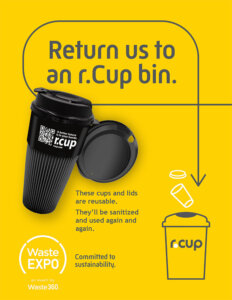
The decision to experiment with r.World’s reuseable cups was made only about a month before WasteExpo 2024 was scheduled to begin. (Courtesy r.World)
The stackable, takeaway-style coffee cups that show organizers introduced last spring at WasteExpo 2024, the largest waste and recycling trade show and conference in North America, weren’t meant to be thrown away, composted, or recycled. They were reusable — meant to be kept out of the waste and composting streams altogether, said Informa Markets’ Cory Karalekas, CEM, WasteExpo’s show manager.

Cory Karalekas
More than 4 billion single-use cups are thrown out at live events each year in the U.S., and only 9 percent of plastic is recycled, according to r.World, a company which provides reusable drink cup services to event venues and other businesses. In the events world, “we think a lot about recycling and composting,” Karalekas said. “A lot of times people forget about the reuse part of sustainability.”
Karalekas was familiar with reusable cups, through the Natural Products Expo West, in Anaheim, California, where she previously was operations manager. She and her team decided to test reuseable coffee cups at the education conference held alongside the WasteExpo trade show. The trade show drew more than 13,500 attendees May 6-9 at the Las Vegas Convention Center (LVCC), and its companion conference, which offered a sustainability track and zero-waste workshop, seemed like a good place to start, Karalekas said, because attendees were interested in progressive ideas. Debuting the cups at a small portion of the event made logistical sense, too, because the decision to experiment with reuseable cups was made only about a month before WasteExpo 2024 was scheduled to begin. Timing was tight, she said, “but we didn’t want to delay a whole more year.”
Their goals, Karalekas added, were to see how attendees reacted and to test the process. “Is this going to be hassle for our team, or for [Sodexo Live!, LVCC’s official F&B supplier]? And finally: “Is this more work than it’s actually worth?”
How Did Attendees Like the Reusable Cups?
People loved them, Karalekas said. “So many people commented on how great they were, and how happy they were that they didn’t have to throw them away,” she said. “I think our audience is just ready for something like this.” The cups were so warmly received, in fact, that getting them deposited into the bright yellow bins set out to collect them turned out to be a problem in some cases, she said. Some people thought they were swag, while others carried them with them to receptions where they used them for wine and back to their rooms. “We were seeing them all over the hotels,” she said. “But people were reusing them, and that was the purpose.”

WasteExpo posted signs reminding attendees to dispose of their reusable r.Cups in special bins. (Courtesy r.World)
How Did the Process Go?
Karalekas and her team used r.World’s service, which delivers cups and other serveware to venues, then picks them up, and washes and sanitizes them. “Sodexo was the one actually handling the cups,” Karalekas said, delivering them to the conference area after r.World delivered them to the convention center. WasteExpo was only charged for cups when they opened a carton: Over the course of the conference, they used 3,120 cups and “we only lost 581,” she said, an 81 percent return rate, lower than the average user according to r.World, she said. The cups were difficult to contain, because the LVCC conference area is open and attendees don’t pass through monitored sets of doors to exit, she said. WasteExpo retrieved cups that were discarded elsewhere in the convention center, because they already were doing back-of-the-house sorting, she said. “It was just an added service to make sure that none of the r.Cups were put in the trash cans or recycling bins.” (The r.Cups, made from recycled plastic and paper cups, are recyclable, according to r.World.)
Was It Worth It?
As to the question of whether it was more hassle than it was worth, “it turned out not to be,” Karalekas said, “so that was great.” There are always things that could go wrong, but the amount of effort and the cost were small, relative to the value of reducing the amount of recycled or waste material, she said.
The most challenging part, she said, was educating the audience, an effort hampered by the short lead time this year. Her team already is planning to use the cups at WasteExpo 2025, potentially expanding it throughout the whole show, she said. In addition to testing the reusable cups with attendees, Karalekas and her team were hoping that the test drive would demonstrate the potential of reuseable cups to Sodexo. “If they were to get on board,” she said, “that’s when we can see real success with it.”
Read more about r.World and the environmental impact of eliminating single-use cups at events at rworldreuse.com.
Barbara Palmer is deputy editor of Convene.
